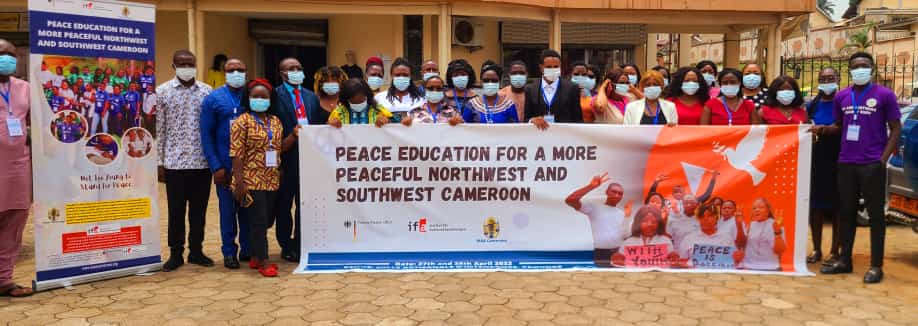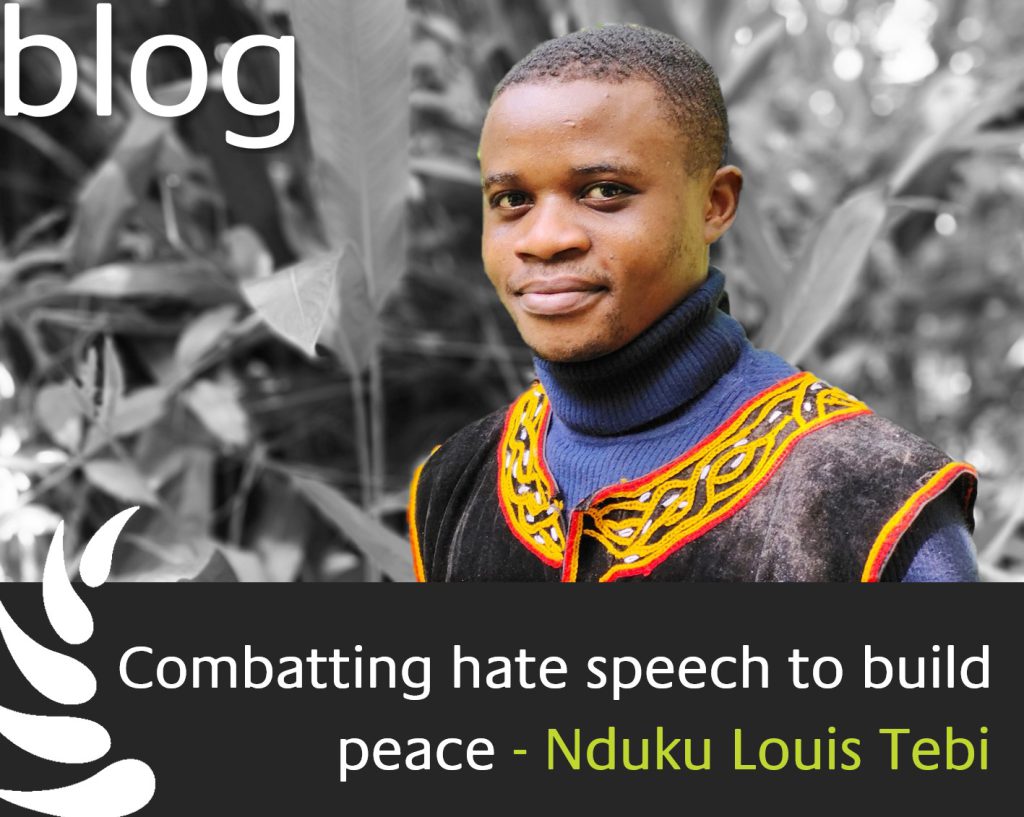Nduku has first-hand witnessed the consequences of the Anglo/ Francophone conflicts in Cameroon. One day coming back from school he was kidnapped by rebels, chained, and tortured. The culture of divide and this terrible experience inspired him to work on curbing hate culture and crimes towards youth. He became an advocate for peace, and through positive interventions wants to abolish hate speech and other harmful practices.
Here is what he wrote about who will be his beneficiaries:
Combatting hate speech to build peace
By Nduku Louis Tebi (1996)
From the year 2000 when the millennium Development Goals were proposed by the United Nations to member states, Cameroon was a signatory to the convention. The developing country located in Central Africa harnessed national efforts towards harmonious living together and equal access to free public education. State subvention covered tuition fees in all public schools from primary to university. Cameroonian youths were happy and collaborated with the government to promote peace, justice, and strong institutions. Cameroon was declared the 3rd most peaceful African Country four consecutive times between the year 2003 and the year 2006 following annual reports from the Global Peace index. The literacy percentage of young people increased from 40% to 60 %.
The security of persons and their property was guaranteed by the goodwill of everyone in society. Young people carried out their daily routines happily hoping for a better future until the year 2011 when ‘Bokoharam’ started attacking local communities in the Extreme Northern Region, and later, in October 2016 when a Teachers and Lawyers strike action turned violent. Teachers were advocating against perceived assimilation and marginalization of the English subsystem of education. In retaliation, uniformed officers retaliated by beating up some protesters, throwing tear gas on demonstrators, and arresting the leaders of the teachers. The Anglophone civil society consortium that represented the interest of Anglophones on the dialogue table with government stakeholders was banned. A school boycott strategy and weekly ghost town on Monday were enforced by outlawed members of the consortium.

Social Media platforms including Facebook, WhatsApp, and Twitter were used to spread hate rumors and propaganda by different parties. The Anglophone diaspora quickly mobilized funds and supported youths back home with weapons for self-defense against military crackdown operations. The spread of hate speech increased online and offline to the extent that thousands of Anglophones matched on the streets declaring a breakaway state from Cameroon called “Ambazonia”. Advocates for the separatist ideology facilitated the creation of armed groups to implement their decisions. Any individual or group who did not support their ideology was considered an enemy. Lack of tolerance further worsened the already bloody conflict.
Claudia is a 23 year old Cameroonian studying communication and development at the University of Bamenda. During the 2019/2020 academic year, she was on her way to campus when armed men took her hostage and brought her to an unknown destination. She was accused of disrespecting a school boycott embargo that was announced on social media and enforced by Pro-Ambazonian combatants. While experiencing her monthly menstrual cycle, she was chained, blindfolded, and beaten several times. Claudia was declared an enemy because she has a strong desire to go to school, however, this interfered with the ideology of her abductors. She however was lucky to be released after a ransom was paid. In this process, a combatant told her that a family member who has an issue with her mother ordered her abduction. Things became clear to her. She understood that a family member used the Ambazonian revolution to spread hate against her from abroad. She returned home traumatized, worried, and more committed than ever before to find her family member so she could take revenge.
Many things are on Claudia’s mind; fear for the unknown, thoughts of returning to school or not, strategies to identify the person who ordered her to be kidnapped, and what can be done to get treated to heal from the horrifying experience.
It is persons like Claudia who would benefit from the work of my organization. I want to make sure that youth who have been affected by conflict, will have pathways to support. And on the side of prevention, I want to focus on methods to reduce hate speech that is being spread on- as well as off-line. We will need to work on creating a better understanding that the only way forward is not against, but, with each other.



